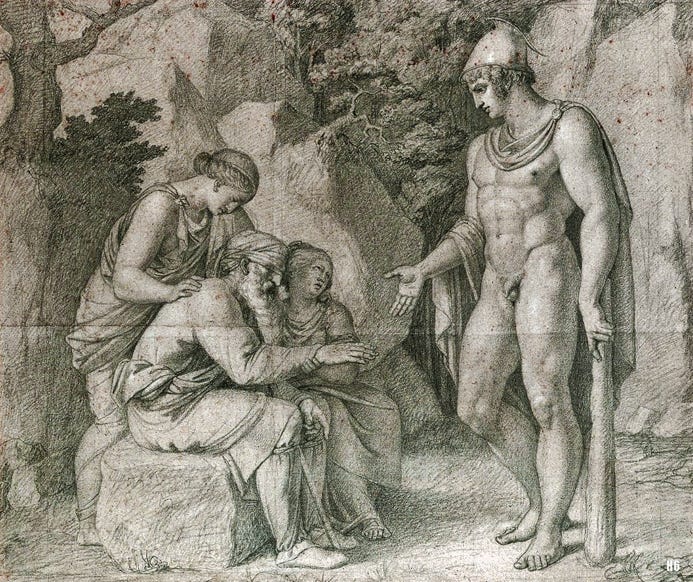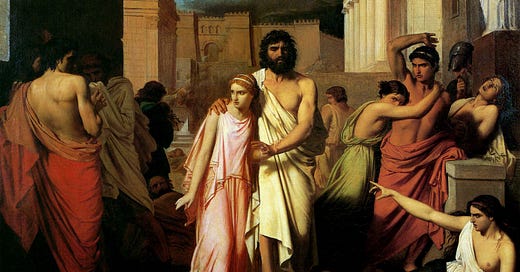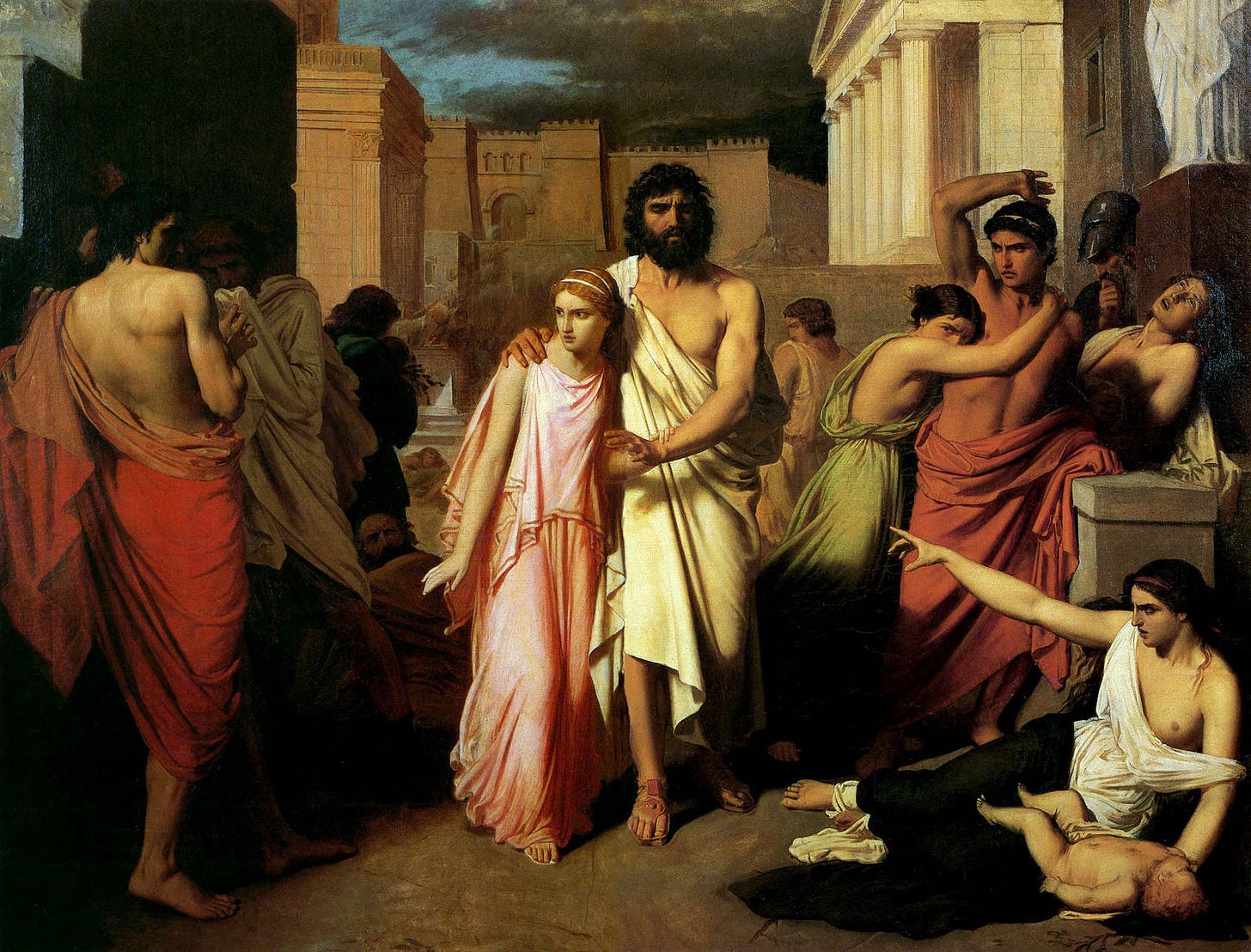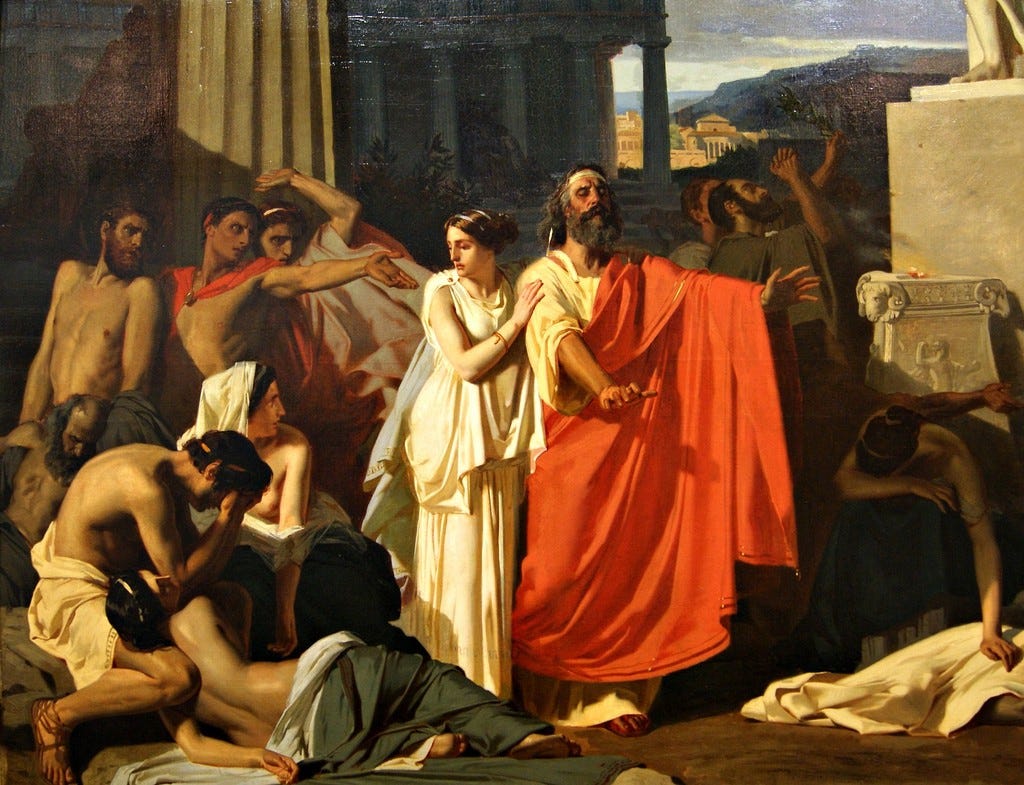Dear Classical Wisdom Reader,
It’s one of the most mysterious of the Greek plays.
Yet it features arguably tragedy’s most famous character. It’s the tale of a once reviled man now being courted by a king in the twilight of his life.
Oedipus at Colonus was written near the very end of Sophocles’ own life, yet it is a play very much in tune with the subtleties of politics.
Discover this astonishing and cryptic masterpiece of Greek theater, and what we can learn from it about fate, family, and the power of stories.
All the best,
Sean Kelly
Managing Editor
Classical Wisdom
Secrets and Accidents: Oedipus at Colonus
By Nicole Saldarriaga
I’m fairly sure it would be safe to say that everyone’s heard of Oedipus. If that’s too much of a generalization, I would only amend it to something like “most people” have heard of him. He’s the legendary character of classical tragedy who killed his father, slept with his mother, and fathered children who were also his siblings. It’s the classic story of patricide and incest.
Largely thanks to the work of Sigmund Freud, the name “Oedipus” has become such an accepted addition to our cultural lexicon that you would be able to have discussions about the “Oedipal complex” with people who have never even heard of Sophocles, let alone read his plays about the aforementioned character.
Many people, then, would be surprised to hear that Sophocles’ Oedipus at Colonus—the last of his three Theban plays—argues that Oedipus’ burial in Athens would bring great benefit and safety to the city. This should immediately raise several eyebrows and one very important question: how can the grave of a man who killed his father, slept with his mother, and begot children who were also his siblings be considered a boon of any kind?
For those of us who need a quick recap, this odd play takes place well after Oedipus discovers the identity of his parents and his own transgressions, blinds himself, and is exiled from Thebes. By this time Oedipus is an old, frail man who has ceaselessly wandered the country with help from his daughter, Antigone.
The play begins as Oedipus and Antigone arrive at Colonus, a small village within sight of Athens (and, incidentally, Sophocles’ birthplace). A wandering stranger tells Oedipus and Antigone that they are standing in a grove sacred to the Furies, which immediately agitates Oedipus. We learn that the same oracle who told him he would kill his father and marry his mother told Oedipus that he would die in a place sacred to the Furies, and his grave would be an immense gift to the place in which he is buried.
Thus the question: how could the grave of a man like Oedipus possibly be considered a gift? In fact, as soon as the villagers of Colonus realize who Oedipus is, they want to kick him out of the village! No one wants anything to do with him—and they certainly don’t want to bury him in town.
No one, that is, except Theseus—the legendary king of Athens. He intervenes, offers Oedipus protection, seems to agree that Oedipus’ grave would indeed be a gift to Athens, and promises to bury him.
Okay, what’s going on here? Many of us may pity Oedipus, but it’s difficult to understand why Theseus would befriend him and defend him so wholeheartedly.
Before diving into an examination of Oedipus’ role in Athens, it’s incredibly important to understand the political relationship between Athens and the titular city, Colonus. It is clear that Colonus is separate from Athens, and when Oedipus and Antigone first arrive, they learn from a wandering stranger that the town has its own unique founding myth. However, when asked if Colonus is ruled by a sovereign, the stranger replies that their ruler is Theseus, Athens’ king.
Even before the hundredth line of the play, we’re led to understand that Athens and Colonus are experiencing some political awkwardness.
According to legend, Theseus was, at the time of the play, attempting to unite the lesser Attic communities with Athens proper in the hopes of forming a cohesive, powerful city-state. The historian Thucydides, in his History of the Peloponnesian War, says:
“In the days of Cecrops and the first kings, down to the reign of’ Theseus, Attica was divided into communes, having their own town halls and magistrates. Except in case of alarm the whole people did not assemble in council under the king, but administered their own affairs, and advised together in their several townships. But when Theseus came to the throne, he, being a powerful as well as a wise ruler…dissolved the councils and separate governments, and united all the inhabitants of Attica in the present city, establishing one council and town hall. They continued to live on their own lands, but he compelled them to resort to Athens as their metropolis, and henceforward they were all inscribed in the roll of her citizens.” (Book 2, Chapter 15)
As readers of Oedipus at Colonus, we are meant to understand that Colonus is still in the process of being absorbed—and this is inherently a complicated process which involves so much more than Theseus declaring himself ruler. For Colonus to be truly united with Athens into one larger city-state, Theseus will have to encourage the people of Colonus to break their natural attachment to the literal, geographical place on which their town was founded. The permanent presence of Oedipus, in the form of his grave, can actually help Theseus achieve the breaking of this bond. To understand how this is possible, we also have to understand how Oedipus has changed since the revelation of his crimes.
By the end of Oedipus the King, Oedipus is so distraught at the realization that he killed his father and slept with his mother that he begs for banishment from Thebes. He appears to completely blame himself for his actions, and says:
“I beg of you in God’s name hide me
somewhere outside your country, yes, or kill me
or throw me into the sea, to be forever
out of your sight.”
These are obviously not the words of a man who believes he’s done nothing wrong.
However, by the time Oedipus arrives in Colonus, he is singing a different tune. “Do not see me as a lawbreaker,” he says to the Chorus, “that I entreat you.” Oedipus, in this play, argues rather passionately that he is guiltier of suffering than he is of law-breaking. His reasoning? That he can’t be fully guilty because his crimes were committed through ignorance.
Basically, Oedipus argues that he did not know he’d be killing his father when he killed Laius (out of self-defense, he’s careful to emphasize), so he can’t be truly guilty of patricide, and he certainly had no idea that Jocasta was his mother when he married her, so he can’t technically be guilty of incest. In essence, he did commit the crimes, but it wasn’t his fault that he committed them, and this double-ness makes him, in some way, innocent.
Of course, this reasoning isn’t exactly bullet-proof—but the point isn’t really to pick it apart. It’s more important to consider how this sort of reasoning would affect our big question: why is Oedipus’ grave a gift?
Oedipus tells Theseus that for his burial to bring true benefit and protection to Athens, the location must be kept completely secret. He entreats Theseus to describe the gravesite:
to no man, ever
neither where it is hidden nor in what region,
that doing so may make you a defense
beyond the worth of many shields.
At first glance, the goal of this secrecy seems purely practical: if the burial location of Oedipus were common knowledge, thieves from another city could steal the body and re-bury it in their own city. The true reason is much more complex, and highly symbolic.
In the ancient world, graves were considered sacred ground, and it was forbidden to walk on them. If Oedipus’ grave, like all graves, is to be sacred ground, and no one actually knows where that grave is, Oedipus’ secrecy makes it impossible not to violate the sanctity of the burial site. Anyone, purely through ignorance, could walk upon his grave and thus commit a crime.
This crime-through-ignorance is a clear echo of Oedipus’ own transgressions, and because of this, his burial site seems to bring a kind of pervading guilt to Athens. But this doesn’t tell us why his grave is considered a gift—or what it has to do with Theseus’s unification project.
If Oedipus’ ignorance makes him in some way innocent, his life reveals to us that we are not responsible for who we get as parents—or what family we’re born into (I’m sure we all know plenty of people who have expressed this same idea before, usually while they’re angry and talking about never calling home again). Family is, in essence, accidental.
The idea that family is accidental immediately implies that the natural attachment a person will feel for his or her family is, for all intents and purposes, irrational. For example, Oedipus would probably say that it makes more sense to love your sister because she’s a lovely person with whom you’re close than to love her simply because you share the same mother.
Because the mental and emotional processes that attach us to our family are so similar to the processes that attach us to our cities, countries, or general places, this idea that the attachment is irrational is the number one weapon Theseus can use to break the bonds between people and particular place.
Oedipus’ grave, in that case, doesn’t symbolize guilt as much as it symbolizes the irrationality of our attachment to things we didn’t even consciously choose for ourselves.

This is absolutely critical to Theseus’s plan for a unified Athens. It is not enough for the lesser Attic communities to recognize his sovereignty—they have to feel Athenian. Even if they remain on the same land, in the same houses—even if daily life barely changes—the people of Colonus (and the people of every other town Athens is absorbing) have to become “people of Athens.” Without this kind of mental and political cohesion, Theseus’s imagined city-state would fall apart, and the whole area would be incredibly vulnerable not just to outside attack, but also to internal conflicts between communities. However, this cohesion is impossible if the townspeople don’t first reject their attachments to the land on which they were born.
This is why Theseus chooses to protect Oedipus, and to grant Oedipus’ requests. The permanent (though hidden) presence of Oedipus’ grave and its symbolic meaning does indeed grant Athens a very important boon. By promoting the principles that Oedipus’ life and death represent—disassociation from the accidental, the rejection of irrationality—Theseus is one step closer to uniting the lesser Attic communities into the wealthy, powerful, and especially cohesive city-state we know Athens became—a city-state whose wealth and power would indeed provide a great deal of protection.
So, in some way, the answer is yes: a man who killed his father and slept with his mother can play a big role in Athens’ survival and success—at least according to Sophocles.
Or perhaps it would be more accurate to say that the idea of a man like Oedipus can play a role—and that’s really the point, in the end, of the play. Like so many classical tragedies, Oedipus at Colonus ultimately points back to the importance of tragedy, or poetry, itself. Oedipus’ grave may lead citizens to realize the irrationality of their attachments to things over which they had no control, but only because those citizens will know Oedipus’ story. A grave without a story would simply be a plot of land. Athens gets no real benefit from the physical grave alone—all the benefit comes from a combination of the secret grave and the circulation of Oedipus’ tale.
The city benefits, then, from the presence of poetry, or tragedy to be specific, and Athens’ particular devotion to tragedy will be one more thing that holds its citizens together—and ultimately sets Athens apart.







